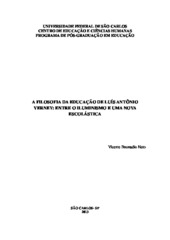| dc.contributor.author | Buonadio Neto, Vicente | |
| dc.date.accessioned | 2016-06-02T19:39:38Z | |
| dc.date.available | 2013-10-23 | |
| dc.date.available | 2016-06-02T19:39:38Z | |
| dc.date.issued | 2013-08-28 | |
| dc.identifier.citation | BUONADIO NETO, Vicente. A filosofia da educação de Luís Antônio Verney: entre o iluminismo e uma nova escolástica. 2013. 1 f. Dissertação (Mestrado em Ciências Humanas) - Universidade Federal de São Carlos, São Carlos, 2013. | por |
| dc.identifier.uri | https://repositorio.ufscar.br/handle/ufscar/2682 | |
| dc.description.abstract | Monographic study, historical interpretation in the area of philosophy of education. In True Method of Studying, Luis Antonio Verney openly criticizes the education provided by the Jesuits, blaming them for all cultural and educational backwardness of the Kingdom. Grounded in modern philosophy, Verney, proposes a reform at all levels of educational Portugal - primary, secondary and higher education - formulating a new ideology of education for the state. Based on empiricism, which started from the observation and experience, contrasted to the formal logic of the deductive method of the scholastics, foundation of Ratio Studiorum of the Jesuits. His criticisms and proposals influenced the creation of the first secular educational system in Portugal, after the expulsion of the Jesuits in the reforms of Pombal. While that seems to have disrupted with the scholastic model by proposing empiricism, his enlightenment was conservative, not revolutionary, Catholic, because he always defended the maintenance of (the) faith , fidelity to the Church, conciliation between faith and reason , which are the foundations of scholasticism. In this work, the following questions are raised: What were the main characteristics of the Enlightenment of Portuguese pedagogy? Did Verney disrupt scholasticism? Or just added some ideas of modern philosophy, maintaining the essence of that current of thought? This work seeks to understand how the creation of Portuguese public education occurred, and thus better understand, too, the Brazilian education. Bibliographical monography based upon the historical-critical methodology. We conclude that Verney disrupted scholasticism partially, by proposing a new method based on empiricism of Locke and blaming the Jesuit educational model for the delay of the kingdom, but at the same time kept as Portuguese priest the ideology of the Catholic faith, and, because of that he created a new Portuguese scholastic. He brought major contributions to the educational reform in the kingdom such as the appreciation of the Portuguese to the Latin, the secularization of the educational system, the education of women, literacy for all subjects, the creation of a new academic education based on the appreciation of the experience, among others. | eng |
| dc.format | application/pdf | por |
| dc.language | por | por |
| dc.publisher | Universidade Federal de São Carlos | por |
| dc.rights | Acesso Embargado | por |
| dc.subject | Educação - história | por |
| dc.subject | Portugal - iluminismo | por |
| dc.subject | Reforma do ensino | por |
| dc.subject | Escolástica | por |
| dc.subject | Iluminismo português | por |
| dc.subject | Reformas educacionais | por |
| dc.subject | Verdadeiro método de estudar | por |
| dc.subject | Portuguese enlightenment | eng |
| dc.subject | Educational reforms | eng |
| dc.subject | True method of studying | eng |
| dc.subject | Scholasticism | eng |
| dc.title | A filosofia da educação de Luís Antônio Verney: entre o iluminismo e uma nova escolástica | por |
| dc.type | Dissertação | por |
| dc.contributor.advisor1 | Tagliavini, João Virgílio | |
| dc.contributor.advisor1Lattes | http://genos.cnpq.br:12010/dwlattes/owa/prc_imp_cv_int?f_cod=K4785993Z0 | por |
| dc.description.resumo | Estudo monográfico, histórico, interpretativo na área de filosofia da educação. No Verdadeiro Método de Estudar, Luís Antônio Verney critica abertamente a educação oferecida pelos Jesuítas, responsabilizando-os por todo atraso cultural e educacional do Reino. Embasado na filosofia moderna, Verney, propõe uma reforma em todos os níveis educacionais de Portugal - escolas primárias, secundárias e o ensino superior -, formulando uma nova ideologia educacional para o Estado. Baseado no empirismo, que partia da experiência, contrapunha-se à lógica formal do método dedutivo dos escolásticos, fundamento do Ratio Studiorum dos jesuítas. Suas críticas e propostas influenciaram a criação do primeiro sistema educacional secular de Portugal, após a expulsão dos jesuítas nas reformas pombalinas. Ao mesmo tempo em que parece ter rompido com o modelo escolástico, ao propor o empirismo, o seu iluminismo foi conservador, não revolucionário, católico, porque ele sempre defendeu a manutenção da fé, a fidelidade à Igreja, a conciliação entre fé e razão, que são as bases da escolástica. Levantam-se, neste trabalho, as seguintes questões: quais foram as principais características do iluminismo da pedagogia portuguesa? Verney rompeu com a escolástica? Ou apenas acrescentou algumas ideias da filosofia moderna, mantendo a essência dessa corrente de pensamento? Busca-se entender como ocorreu a gestação da educação pública portuguesa, e, dessa forma, compreender melhor, também, a educação brasileira. Trabalho bibliográfico com base na metodologia histórico-crítica. Concluímos que Verney rompeu em partes com a escolástica, ao propor um novo método baseado no empirismo de Locke e ao responsabilizar o modelo educacional dos jesuítas pelo atraso do reino; mas ao mesmo tempo manteve como sacerdote português a ideologia da fé católica, por isso, criou uma nova escolástica portuguesa. Trouxe contribuições importantíssimas para a reforma da educação do reino, como a valorização da língua portuguesa perante o Latim, a secularização do sistema educacional, o ensino das mulheres, a alfabetização de todos os súditos, a criação de um novo ensino universitário pautado na valorização da experiência, entre outras. | por |
| dc.publisher.country | BR | por |
| dc.publisher.initials | UFSCar | por |
| dc.publisher.program | Programa de Pós-Graduação em Educação - PPGE | por |
| dc.subject.cnpq | CIENCIAS HUMANAS::EDUCACAO | por |
| dc.contributor.authorlattes | http://lattes.cnpq.br/4353781144213842 | por |
